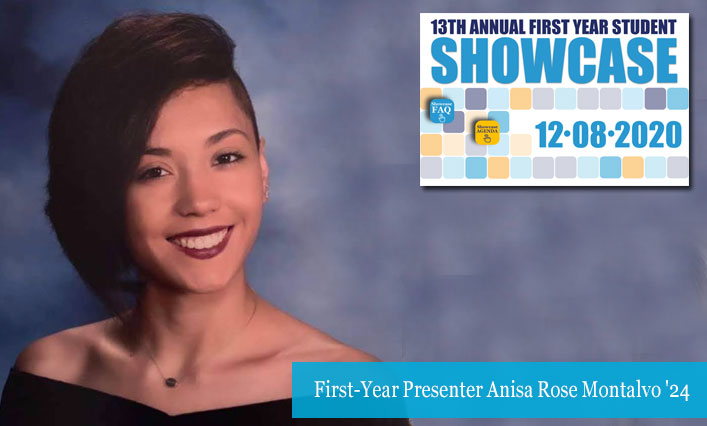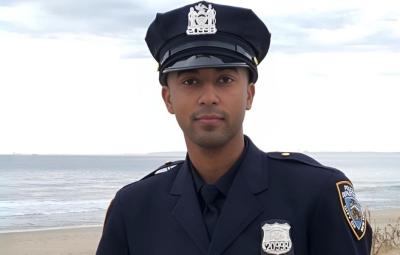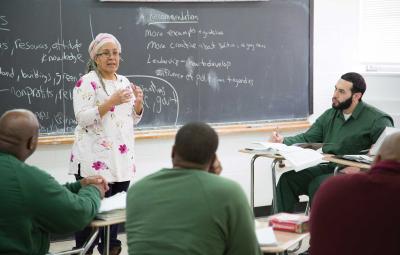
Every fall semester the John Jay community looks forward to seeing first-year students present their semester-long research projects at our annual First-Year Student Showcase. The variety of topics tends to be wide, the methodology for researching the subjects can be intriguing, and the faculty and staff mentorship for our first-year students is always inspiring. Not being able to gather on campus would seem to be a stumbling block for holding the 13th Annual First-Year Student Showcase—as we’d normally peruse hundreds of poster board presentations in the halls of John Jay—but that didn’t stop our students, who were guided by the incomparable Nancy Yang, Associate Director of First Year Programs, who managed our first-ever virtual First-Year Student Showcase.
“While the showcase looks different from years past, this showcase is probably going to be the one that I never forget,” said Yang during the virtual event. “It’s the one where first-year students started their college experience in the middle of a pandemic and found ways to collaborate with each other without ever being physically together. It’s the one where faculty showed their love and support through a screen.” After watching the first-year student presenters mention what they researched over the semester, many viewers wanted a more in-depth look at their projects. That’s where this article series comes in. We connected with some of the presenters and dived a little deeper into their theories, their methodologies, and their findings.
Remembering what she learned in Yang’s class about how flawed memories can be, Anisa Rose Montalvo ’24, a Computer Science and Information Security major, from Westchester County, New York, and her team decided that their research project “Scared,” would use a choose your own adventure game to show how trauma can alter memories in children.
What was your original research hypothesis?
We started with a question: What is the impact of a traumatic event on the memory of a child? Our hypothesis for our project titled “Scared” was that a traumatic event would likely negatively impact a child, so they’ll experience memory loss and faulty memory. Due to personal experiences within our group, trauma and its impact was something we wanted to take a closer look at. We had some previous knowledge on how trauma impacted people. In class, we had to find the relationship between memory and justice, and thanks to Professor Yang’s class, we knew that memory was easily manipulated, flawed, and prone to be false.
“Unlike most research where you have to take your emotions away from the end result, we thrusted emotions into our project. We wanted to make you care and feel empathy. We wanted it to conjure feelings within you and link it to your own life experiences.” —Anisa Montalvo
What specific methodology did you use to conduct your research?
Our methodology was rather simple. We educated ourselves the best we could on everything about childhood trauma, by reading and writing about it. One of the biggest things we did was read first-person accounts of trauma. Then we channeled that information into our end product, a game where feelings were a part of the experience. So, unlike most research where you have to take your emotions away from the end result, we thrusted emotions into our project. We wanted to make you care and feel empathy. We wanted it to conjure feelings within you and link it to your own life experiences. The goal of our research was to educate others and create empathy. We wanted to shine a light on something that wasn’t talked about all the time and we wanted to do it in an engaging, interactive, and easy to understand way.
Your team chose to showcase its research project through a choose your own adventure game. Did you grow up with “choose your own adventure” books?
I always loved books and loved reading as a kid, but I didn’t always love the endings depending on the book, so, I would make up my own. As I got older, I began to play videogames. What is the happy middle ground for a girl who loves making up her own stories and the visuals of video games? Games where your choices and actions, determine the ending. That’s where my love of choose your own adventure games began. My group was quickly on board with something cool like that, and off we went.
“The game was a perfect way to expose people to our research. It’s one thing to read about the experiences and the statistics in a detached way, but it’s another experience completely when you’re in their shoes.” —Anisa Montalvo
Why was it the perfect medium for your research?
Our hope was that through the game and our research, we could educate people about trauma in children. The game was a perfect way to expose people to our research. It’s one thing to read about the experiences and the statistics in a detached way, but it’s another experience completely when you’re in their shoes. Choose your own adventure games puts the fate of a character in your hands. Knowing your choices matter makes your experience in the game so real because there are actions and consequences that your character will face. In our game, your choices gave you one out of four endings. Your memory had consequences, just like real life.
The majority of people who played the game got the semi-good ending. Once they found that out, they would play again because they wanted to get the best ending for their character. They would go back and re-read the facts, which they may have not even realized they were learning the first time around, and made better choices. Making the project a game, created an environment where people want to learn. And while this is a short version of learning via choose your own adventure games; it’s a start, and I actually intend to continue on this route.
During your research did your team encounter any specific obstacles?
The biggest obstacle we faced was really creativity based. We had all these ideas and had to pack all this information into 10 minutes, where we wanted you to feel and learn something simultaneously. The game we made could’ve easily been made into an hour-long experience, but we didn’t have that option for the showcase. So we had to edit, snipping out the unnecessary parts and putting the information we wanted into the parts that were saved. Then there were times where the information wouldn’t line up with the narrative we wanted to portray, so we had to change our plot around the facts because of some falsehoods we assumed in the beginning. It was definitely challenging and time consuming but completely worth it. When we finished, we all celebrated—I went and got ice cream. It was the most liberating feeling knowing we had created something. We felt really proud.
“We found that the best way to educate someone on inherently painful topics is to really invoke empathy and compassion in the learner.” —Anisa Montalvo
When the research concluded, what were some of your conclusions?
Our biggest conclusion was that trauma does in fact impact memory, especially those as malleable as a child’s memory. Also, we found that the best way to educate someone on inherently painful topics is to really invoke empathy and compassion in the learner.
What surprised you the most about this experience, both in the research process itself and the final
results?
Honestly, I was surprised by how interesting the research process can be. I really enjoyed it. This experience made me want to conduct more research. I want to study topics I wouldn’t usually study. I didn’t expect that to happen when I started this project.
Knowing what you know now, what would you say to another student about to embark on a research project?
Choose research that centers around something you are passionate about. Make your research into something you want to share with the world. Love your topic and the process. If you do that, the research experience will be amazing, and your project will come alive before your eyes.



